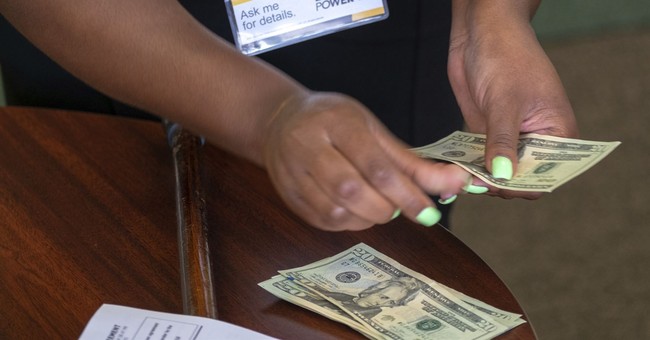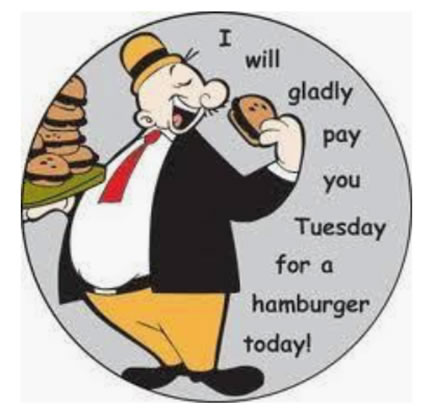
Posted on 02/27/2020 6:35:48 AM PST by Kaslin

Congress is taking aim at short-term loans. The Veterans and Consumers Fair Credit Act (H.R. 5050) would set a federal cap on loan interest rates. The intention is to protect consumers, but capping interest rates would have the opposite effect, doing the most harm to those with the least financial means.
Proponents cite high annual percentage rates (APR) on small-dollar loans to argue that lenders are taking advantage of desperate borrowers. One problem with this argument is that an annual rate is a poor metric by which to judge a loan with a two-week term. For example, the 36 percent APR cap proposed by H.R. 5050 would mean a charge of only $1.38 on a $100 loan over two weeks. That doesn’t come close to covering the fixed cost of running of a business, especially one in an industry so heavily regulated as financial services, nor provide sufficient compensation to justify serving those at highest risk of default.
Whenever politicians pick an arbitrary limitation on market prices, the expected response can be anticipated by first imagining the most extreme limitation. What would happen, in other words, if no interest could be charged for a loan? Quite simply, there would be no lending. A slightly less onerous limitation, such as a 5 percent cap would see some lending but only in large dollar amounts and to the most credit-worthy individuals.
The pattern should be easy to see: the lower the cap, the fewer borrowers that will be served. The corollary is that allowing market prices to work ensures the maximum number is served.
A study by Thomas Durkin and Gregory Elliehausen of the Federal Reserve Board and Min Hwang of George Washington University found that a 36 percent APR cap would require loans of at least $2,600 for lenders to break even. Since lenders aren’t in the business of losing money, this effectively bans loans of less than $2,600 and forces those who need smaller loans to choose from less desirable options.
Basically, the proposed cap won’t affect most borrows who are able to secure conventional loans. For those without easy access to credit, however, like the over 8 million households found to be unbanked in a 2017 survey by the Federal Deposit Insurance Corporation, it will mean nowhere to turn other than black market loan sharks or relying on family and friends.
There’s more than just theory telling us to expect this result.
When Chile lowered its rate cap on small, unsecured loans from 56 to 36 percent in 2013, it allowed researchers to study the impact on consumer welfare. J. Cuesta and A. Sepulveda found that 16 percent of borrowers benefited a very small amount, but 82 percent were harmed to a much greater degree through loss of credit access.
Similarly, a study by Carlos Madeira at the Central Bank of Chile found an estimated 9.7 percent of households were excluded from bank credit, with the strongest impact on the youngest, least educated and poorest families. Many other studies report similar findings.
Politicians often make the mistake of assuming that poor people necessarily make bad financial decisions. Instead, more often than not, they are simply choosing the least bad option available. The way to improve their situation is not to take away that option, no matter how unsavory it may seem to those privileged with better alternatives, but to find ways to expand the range of choices available to the poor.
In the financial industry, that might mean revisiting government regulations that make the cost of doing business excessively high. Unfortunately, that’s not as politically easy as singling out one industry as the bad guy and promising to protect consumers from their unsavory ways. The poor don’t need that kind of “protection” from their own choices, especially when it will leave them unquestionably worse off.
Once again the Law of Unintended Consequences coupled with an unfailingly defective understanding of human behavior and economics.
Do they think people that use Pay Day loans are too stupid to tell they’re high interest and foolishly use them instead of selling their Krugerrands?
Do they think lenders will offer the loans more cheaply and enjoy less or no return on capital risked? Probably by snorkeling into their Scrooge McDuck basement full o’ currency.
I guess so.
We had federal usury limits on credit cards and such throughout the 60s and 70s, and the economy prospered.
While I appreciate the need of the credit-challenged for money on occasion, charging these desperate people as much as 200% annual interest on car title and other loans does not help in the long run, but bleeds them for extended periods of time. Some never climb out of that credit trap.
With hard security like automobiles, charging such astronomical rates is unconscionable. I do not ordinarily support federal intervention in the marketplace, but this abuse of the poor is obscene and needs to be addressed.
On one of my computers, I captured a graphic of a loan advertisement.
In the small print was the interest rate. 108%
It was from a Native American reservation.
Well ya can’t have everything.
We could legalize loan sharking and that would open up even more credit to even more Americans. But does anybody really want to do that?
You are always going to have to make judgments about whether the moral cost of doing something is actually worth the increase in growth.
“Do they think people that use Pay Day loans are too stupid”
Yes.
They’re certainly too stupid to have money.
Perhaps the Government should impose an interest rate limit on private businesses when they themselves stop charging exorbitant high interest rates.
In Texas - delinquent property tax rates can escalate to 23%.
IRS tax penalty rates can max out at 25%.
‘Im all for this. Payday lenders are scum .I know someone who due to a hospital bill, got a car title loan. They raped him. He ended up paying 5000 percent. Governor Kemp here in GA is good friends with these scum..
Your example is a bad one.
Many years ago, I knew a young couple where the husband was only loosely connected to the labor market (that's PC speak for "had a hard time holding down a job"). They bought a used car on time, but instead of making payments they just drove it off into another state and ended up only making 2 payments out of 48.
A car may be a "hard" asset, but it is a mobile hard asset and getting it back to secure the loan can be a real challenge.
I lost track of them and don't know how they are doing now, but I suspect the only reasonable answer is "poorly".
If someone has options in how to borrow money, they will shop around until they find an acceptable rate. But there is a place in the financial world for payday lenders who charge seemingly outrageous interest -- frequently the default rates demand that.
Yeah, I know some people will not be able to get credit at those rates. But maybe those people need to declare bankruptcy or make other drastic lifestyle changes sooner rather than later to deal with it.
Personally, I was glad when Pennsylvania drove the payday lenders out of business. We have enough crooks in this commonwealth as it as and don't need to be subsidizing others. And make no mistake about it, we do. When payday lenders and crooks of similar ilk suck people dry, they are on public benefits for longer than they would otherwise be and/or begin to see it as a permanent lifestyle. It needs to be painful, stigmatized and as temporary as possible.
We had usury laws capping credit card interest rates until SCOTUS decided to scrap that historic practice in 1978, Marquette National Bank v. First of Omaha Service Corp.
A decision that also set in a motion a vast increase in the debt level owed by Americans. Ben Franklin’s admonitions about owing money were ignored.
This indifference to debt has created the student loan industry. It prospers by having purchased protection from bankruptcy laws and by taking advantage of the gross ignorance of 18 yr olds.
Lenders and colleges need to have some skin in this game so that they quit throwing money at worthless degrees. They have been sowing the seeds of socialism in the kids who end up with all of this debt with nothing to show for it.
“Payday lenders are scum”
Many of them are part of well known Wall Street firms, hiding behind tacky strip mall exteriors.
Subprime lending version 2.0.
Make the loans, collateralize the paper, sell it to investors.
The only good part for the rest of us is that unlike the subprime mortgage market, payday lending is too small to wreck the global economy if all of the borrowers default.
In the long run it'll be better for them!
Scalping?
Again??
What's the minimum wage in that state?
We still make it to easy for druggies to live off the fat of the land, which is why we have so many of them.
That thought came to mind, believe me.

Disclaimer: Opinions posted on Free Republic are those of the individual posters and do not necessarily represent the opinion of Free Republic or its management. All materials posted herein are protected by copyright law and the exemption for fair use of copyrighted works.